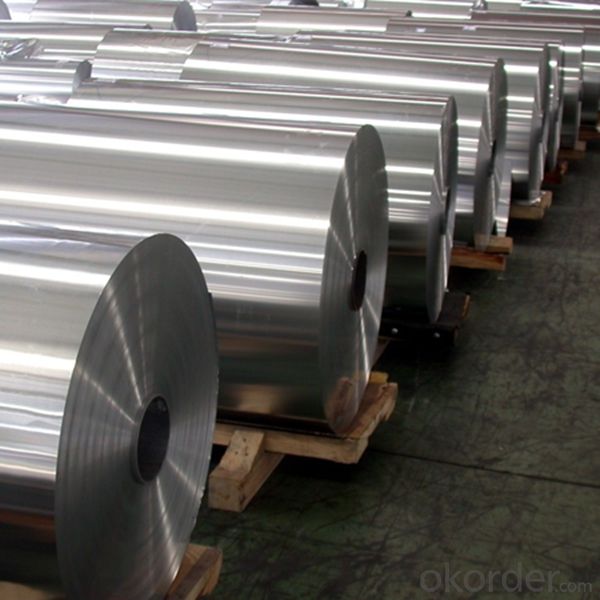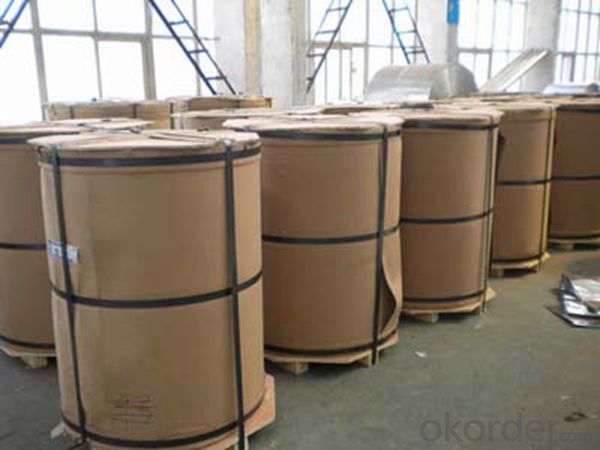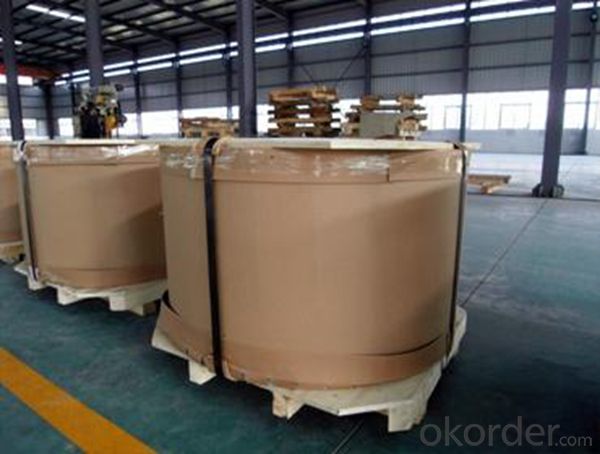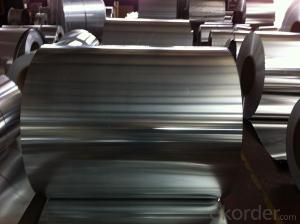Mill Finished Aluminium Coil AA1070 for Building
- Loading Port:
- Shanghai
- Payment Terms:
- TT OR LC
- Min Order Qty:
- 5 m.t.
- Supply Capability:
- 10000 m.t./month
OKorder Service Pledge
OKorder Financial Service
You Might Also Like
Item specifice
1. Specification of Mill Finished Aluminium Coil AA1070 for Building
characteristics | Application |
1) Super peeling strength | 1) Building exterior curtain walls |
2) Excellent surface flatness and smoothness | 2) Decoration and renovation additions for old buildings |
3) Superior weather, corrosion, pollutant resistance | 3) Decoration of interior walls, ceilings, bathrooms, kitchens and balconies |
4) Even coating, various colors | 4) Shop door decorations |
5) Fireproof, excellent heat and sound insulation | 5) Advertisement board display platforms and signboards |
6) Superior impact resistance | 6) Wallboards and ceilings for tunnels |
7) Lightweight and easy to process | 7) Industrial materials, materials for vehicles and boats |
2. Application of Mill Finished Aluminium Coil AA1070 for Building
(1).Interior: wall cladding, ceilings, bathrooms, kitchens and balconies, shutters, doors...
(2).Exterior: wall cladding, facades, roofing, canopies, tunnels, column covers , renovations...
(3).Advertisement: display platforms, signboards, fascia, shop fronts...
3. Feature of Mill Finished Aluminium Coil AA1070 for Building
• Our goods quality is top, the surface is smooth, and every steel coil
• No Joint, No Bends, no spots, no roller marks.
• MTC will be provided with goods, third part inspection is acceptable, for example, SGS, BV. Etc
Be free from Oil Stain, Dent, Inclusion, Scratches, Stain, Oxide Dicoloration, Breaks, Corrosion, Roll Marks, Dirt Streaks and other defect which will interfere with use
4. Certificate:
SGS and ROHS(if client request, paid by client), MTC(plant provided), Certificate of Origin(FORM A, FORM E, CO), Bureau Veritas and SGS (if client request, paid by client), CIQS certificate
5. Image of Mill Finished Aluminium Coil AA1070 for Building



6. Package and shipping of Mill Finished Aluminium Coil AA1070 for Building
eye to wall
eye to the wall
with wood pallet (wooded case also available)
7. FAQ
1) What is the delivery time?
Dpends on actual order, around 20 to 35 days
2)What is the QC system:
We have QC staff of 20 persons and advanced equipment, each production is with MTC traced from Aluminum ingot lot.
3) What market do you mainly sell to?
Australia, America, Asia, Middle East, Western Europe, Africa etc
- Q:What are the different slitting options for aluminum coils?
- Aluminum coils offer a variety of slitting options to meet specific requirements and end uses. The commonly employed choices for slitting aluminum coils are as follows: 1. Single Slit: The most fundamental and extensively utilized option involves cutting the aluminum coil into two narrower coils with a single cut at the center. 2. Double Slit: This option entails two parallel cuts along the center of the aluminum coil, resulting in smaller widths for each coil. 3. Multi-Slit: Multiple parallel cuts along the center of the aluminum coil allow for the creation of several narrower coils from a wider one. 4. Ribbon Slit: When the aluminum coil needs to be divided into very thin strips, like those used in electrical wiring or packaging, this slitting option is employed. 5. Oscillate Slit: This option suits applications that require varying widths of aluminum strips. The coil is slit in a back-and-forth motion, offering flexibility in producing different widths. 6. Custom Slitting: To accommodate specific project needs, custom slitting options can be employed. This involves tailoring the slitting process to achieve unique widths, lengths, or shapes of aluminum strips. When selecting the appropriate slitting option for aluminum coils, it is crucial to consider the desired application, required dimensions, and the capabilities of the slitting equipment.
- Q:How are aluminum coils tested for quality assurance?
- Aluminum coils are tested for quality assurance through various methods and parameters to ensure their compliance with industry standards and customer requirements. One of the most common tests performed on aluminum coils is the dimensional inspection, where the dimensions and tolerances of the coils are measured and compared with the specifications. This ensures that the coils are manufactured within the required size and shape. Another important aspect of quality assurance testing is the evaluation of the mechanical properties of the aluminum coils. This includes tests such as tensile strength, yield strength, elongation, and hardness. These tests determine the strength and durability of the coils, ensuring that they can withstand the intended applications and environments. To assess the surface quality of the aluminum coils, visual inspection and non-destructive testing methods are employed. Visual inspection involves examining the coils for any visual defects, such as scratches, dents, or surface irregularities. Non-destructive testing techniques, such as ultrasonic testing or eddy current testing, are used to detect any hidden defects or flaws within the coils. Furthermore, chemical analysis is conducted to determine the composition and purity of the aluminum coils. This is vital to ensure that the coils meet the required chemical composition standards, as impurities can affect their performance and integrity. Additionally, corrosion resistance testing is performed to evaluate the ability of the aluminum coils to withstand corrosion in different environments. This is crucial, especially for applications where the coils will be exposed to harsh conditions or corrosive substances. Overall, the quality assurance testing of aluminum coils involves a combination of physical, mechanical, visual, and chemical evaluations. These tests are conducted at different stages of the manufacturing process to ensure that the coils meet the highest quality standards and provide reliable performance in their intended applications.
- Q:Are aluminum coils more cost-effective compared to other materials like copper?
- Yes, aluminum coils are generally more cost-effective compared to other materials like copper. There are several reasons for this. Firstly, aluminum is a more abundant metal than copper, which makes it cheaper to produce. This abundance also means that aluminum prices tend to be more stable and less prone to fluctuations in the market, further contributing to its cost-effectiveness. Secondly, aluminum coils have a lower density compared to copper coils, resulting in lighter weight units. This lighter weight not only reduces transportation and installation costs but also makes aluminum coils easier to handle and maneuver during the manufacturing process. Additionally, aluminum coils have excellent thermal conductivity properties, which means they can effectively transfer heat. This allows for more efficient cooling or heating systems, resulting in lower energy consumption and operating costs over time. Moreover, aluminum has a higher resistance to corrosion compared to copper, making it more durable and requiring less maintenance. This increased lifespan of aluminum coils reduces replacement and repair costs, further enhancing their cost-effectiveness. Lastly, aluminum coils are recyclable, and the recycling process requires significantly less energy compared to producing new aluminum. This aspect contributes to the overall sustainability and cost-effectiveness of aluminum coils. Overall, considering the lower production costs, lighter weight, superior thermal conductivity, increased durability, and recyclability, aluminum coils are indeed more cost-effective compared to other materials like copper.
- Q:How are aluminum coils protected against chemical exposure?
- Aluminum coils are protected against chemical exposure through the application of corrosion-resistant coatings or anodizing processes. These protective measures create a barrier between the aluminum surface and the chemicals, preventing direct contact and minimizing the risk of corrosion or degradation.
- Q:Can aluminum coils be used in solar panel systems?
- Yes, aluminum coils can be used in solar panel systems. Aluminum is a popular material choice for solar panel frames and supports due to its lightweight yet strong nature. It is corrosion-resistant, durable, and has excellent thermal conductivity, making it suitable for withstanding harsh weather conditions and efficiently dissipating heat generated by the solar panels. Additionally, aluminum is also highly recyclable, which aligns with the sustainable nature of solar energy systems. Overall, the use of aluminum coils in solar panel systems contributes to their efficiency, longevity, and environmental friendliness.
- Q:Can aluminum coils be used in high-radiation environments?
- Aluminum coils can be used in high-radiation environments, but their performance and durability may be affected depending on the level of radiation exposure. Aluminum is a relatively good conductor of heat and electricity, making it a suitable material for many applications, including coil systems. However, when exposed to high levels of radiation, aluminum can become more susceptible to degradation and corrosion. In high-radiation environments, the primary concern is the potential for radiation-induced damage to the material. Aluminum is considered to have relatively low radiation resistance compared to other metals, such as stainless steel or titanium. As a result, prolonged exposure to high radiation levels can lead to structural changes, including embrittlement and loss of mechanical properties. To mitigate these risks, several factors need to be considered. The specific radiation level, duration of exposure, and the intended application of the aluminum coils are critical in determining their suitability for use in high-radiation environments. Additionally, protective coatings or treatments can be applied to enhance the radiation resistance of the aluminum coils, increasing their durability and longevity. Ultimately, the decision to use aluminum coils in high-radiation environments should be based on a thorough assessment of the radiation levels, the potential risks, and the specific requirements of the application. Consulting with radiation experts and considering alternative materials may be necessary to ensure the best performance and safety in such demanding conditions.
- Q:Are there any special considerations for handling and storing aluminum coil scraps?
- There are specific factors to take into account when it comes to the handling and storage of aluminum coil scraps. To start with, it is crucial to handle these scraps with caution in order to prevent any potential injuries. Due to their sharp edges, workers should wear appropriate protective gear, such as gloves and safety glasses, while dealing with them. When it comes to storing aluminum coil scraps, it is of utmost importance to keep them in a dry and well-ventilated area. Moisture can cause corrosion in the aluminum, leading to the degradation of the material. To prevent this, it is recommended to store the scraps in a covered area or utilize moisture-absorbing materials. Moreover, it is essential to separate aluminum coil scraps from other materials, particularly those that can result in a chemical reaction or contamination. This is especially important if the aluminum coil scraps have been coated or treated with other substances. Furthermore, it is advisable to stack and store the aluminum coil scraps properly to avoid any damage or accidents. By stacking them in a stable manner and using appropriate equipment like pallets or racking systems, the risk of collapse or shifting can be minimized. Lastly, it is crucial to adhere to local regulations and guidelines regarding the handling and storage of aluminum coil scraps. These regulations may differ depending on the location and industry, so it is vital to stay informed and comply with any specific requirements. By taking these considerations into account, companies can ensure the secure handling, storage, and preservation of aluminum coil scraps, thereby reducing the possibility of accidents, damage, and deterioration.
- Q:What type of equipment is used to process aluminum coils?
- The equipment employed for aluminum coil processing varies depending on the specific manufacturing process and requirements. Nevertheless, there are several common types of equipment used in this process: 1. Uncoilers/Decoilers: These machines are utilized to unroll and straighten the aluminum coils, facilitating further processing. 2. Levelers: Leveling machines are employed to flatten the surface of the aluminum coil, ensuring it is even and flat before proceeding with additional processing. 3. Slitters: Slitting machines are used to cut the aluminum coil into narrower strips of desired widths. This equipment finds frequent use in industries such as automotive, construction, and packaging. 4. Shears: Shearing machines are employed to cut the aluminum coil into specific lengths or shapes required for the manufacturing process. 5. Roll Forming Equipment: Roll forming machines shape the aluminum coil into specific profiles or designs. Commonly employed in the construction industry, they are used to manufacture roofing panels, gutters, and siding. 6. Heat Treatment Furnaces: Heat treatment furnaces subject the aluminum coil to specific temperature conditions to enhance its strength, hardness, or other desired properties. 7. Surface Treatment Equipment: Various equipment, including cleaning machines, chemical baths, and coating lines, are used for surface treatment processes such as cleaning, anodizing, or painting the aluminum coil. These processes improve the coil's appearance, corrosion resistance, or other functional properties. 8. Packaging Equipment: Packaging machines are employed to bundle, wrap, or pack the processed aluminum coils for storage, transportation, or further distribution. It is crucial to note that the specific equipment used may vary depending on factors such as size, thickness, alloy, and intended use of the aluminum coils. Manufacturers often utilize customized equipment to meet their specific requirements and ensure efficient processing.
- Q:What are the different coil edge profiles available for aluminum coils?
- Some of the different coil edge profiles available for aluminum coils include slit, deburred, rounded, and full round edges.
- Q:What is the maximum width and thickness of aluminum coils?
- The specific requirements and capabilities of the manufacturer play a role in determining the potential variation in the maximum width and thickness of aluminum coils. Generally, aluminum coils can have a maximum width that spans from 36 inches to 72 inches, or potentially wider. In terms of thickness, it typically falls within the range of 0.006 inches to 0.25 inches. It is crucial to acknowledge that these measurements may differ across industries and applications. Therefore, it is advisable to consult the manufacturer or supplier to ascertain the particular maximum width and thickness that align with your needs.
1. Manufacturer Overview |
|
|---|---|
| Location | |
| Year Established | |
| Annual Output Value | |
| Main Markets | |
| Company Certifications | |
2. Manufacturer Certificates |
|
|---|---|
| a) Certification Name | |
| Range | |
| Reference | |
| Validity Period | |
3. Manufacturer Capability |
|
|---|---|
| a)Trade Capacity | |
| Nearest Port | |
| Export Percentage | |
| No.of Employees in Trade Department | |
| Language Spoken: | |
| b)Factory Information | |
| Factory Size: | |
| No. of Production Lines | |
| Contract Manufacturing | |
| Product Price Range | |
Send your message to us
Mill Finished Aluminium Coil AA1070 for Building
- Loading Port:
- Shanghai
- Payment Terms:
- TT OR LC
- Min Order Qty:
- 5 m.t.
- Supply Capability:
- 10000 m.t./month
OKorder Service Pledge
OKorder Financial Service
Similar products
New products
Hot products
Related keywords




























